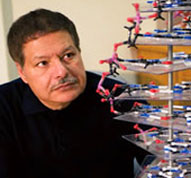Arab Americans
Dr. Ahmed Zewail

Ahmed Hassan Zewail (Egyptian Arabic: أحمد حسن زويل, IPA: [ˈæħmæd ˈħæsæn zeˈweːl]; February 26, 1946 – August 2, 2016) was an Egyptian-American scientist, known as the “father of femtochemistry“. He was awarded the 1999 Nobel Prize in Chemistry for his work on femtochemistry and became the first Egyptian to win a Nobel Prize in a scientific field. He was the Linus Pauling Chair Professor of Chemistry, Professor of Physics, and the director of the Physical Biology Center for Ultrafast Science and Technology at the California Institute of Technology.
Birth and education
Ahmed Hassan Zewail was born on February 26, 1946, in Damanhour, Egypt, and was raised in Desouk. He received a Bachelor of Science and Master of Science degrees in Chemistry from Alexandria University before moving to the United States to complete his PhD at the University of Pennsylvania supervised by Robin M. Hochstrasser.
Academic career
After completing his PhD, Zewail did postdoctoral research at the University of California, Berkeley, supervised by Charles Bonner Harris. Following this, he was awarded a faculty appointment at the California Institute of Technology in 1976, and he was made the first Linus Pauling Chair in Chemical Physics. He became a naturalized citizen of the United States on 5 March 1982. Zewail was the director of the Physical Biology Center for Ultrafast Science and Technology at the California Institute of Technology.
Zewail had been nominated and participated in President Barack Obama’s Presidential Council of Advisors on Science and Technology (PCAST), an advisory group of the nation’s leading scientists and engineers to advise the President and Vice President and formulate policy in the areas of science, technology, and innovation.
Research
Zewail’s key work was as a pioneer of femtochemistry—i.e. the study of chemical reactions across femtoseconds. Using a rapid ultrafast laser technique (consisting of ultrashort laser flashes), the technique allows the description of reactions on very short time scales – short enough to analyse transition states in selected chemical reactions. Zewail became known as the “father of femtochemistry“.
Political work
In a speech at Cairo University on June 4, 2009, US President Barack Obama announced a new Science Envoy program as part of a “new beginning between the United States and Muslims around the world.” In January 2010, Ahmed Zewail, Elias Zerhouni, and Bruce Alberts became the first US science envoys to Islam, visiting Muslim-majority countries from North Africa to Southeast Asia.
When asked about rumors that he might contest the 2011 Egyptian presidential election, Ahmed Zewail said: “I am a frank man… I have no political ambition, as I have stressed repeatedly that I only want to serve Egypt in the field of science and die as a scientist.”
During the 2011 Egyptian protests he announced his return to the country. Zewail said that he would join a committee for constitutional reform alongside Ayman Nour, Mubarak’s rival at the 2005 presidential elections and a leading lawyer. Zewail was later mentioned as a respected figure working as an intermediary between the military regime ruling after Mubarak’s resignation, and revolutionary youth groups such as the April 6 Youth Movement and young supporters of Mohamed ElBaradei.
Awards and honors
In 1999, Zewail became the first Egyptian and the first Arab to receive a science Nobel Prize when he was awarded the Nobel Prize in Chemistry. Zewail gave his Nobel Lecture on “Femtochemistry: Atomic-Scale Dynamics of the Chemical Bond Using Ultrafast Lasers”. In 1999, he received Egypt’s highest state honor, the Grand Collar of the Nile.[1] In October 2006, Zewail received the Albert Einstein World Award of Science for “his pioneering development of the new field of femtoscience and for his seminal contributions to the revolutionary discipline of physical biology, creating new ways for better understanding the functional behavior of biological systems by directly visualizing them in the four dimensions of space and time.”
Other international awards include the King Faisal International Prize (1989), Wolf Prize in Chemistry (1993) awarded to him by the Wolf Foundation, the Tolman Award (1997), the Robert A. Welch Award (1997), the Othmer Gold Medal (2009), the Priestley Medal (2011) from the American Chemical Society and the Davy Medal (2011) from the Royal Society.
Zewail was elected a Foreign Member of the Royal Society (ForMemRS) in 2001. He was awarded an honorary doctorate from Heriot-Watt University in 2002. He was awarded an honorary doctorate by Lund University in Sweden in May 2003 and was made a Foreign Member of the Royal Swedish Academy of Sciences. Cambridge University awarded him an honorary Doctor of Science in 2006. In May 2008, Zewail received an honorary doctorate from Complutense University of Madrid. In February 2009, Zewail was awarded an honorary doctorate in arts and sciences by the University of Jordan. In May 2010, he gave the commencement address at Southwestern University. On 3 October 2011 he was awarded an honorary doctorate in science from the University of Glasgow. On 19 May 2014, he was awarded an honorary degree from Yale University. The Zewail city of science and technology, established in 2000 and revived in 2011, is named in his honour.
Personal life
Zewail married his wife Dema Faham in 1989. He had four children: Maha, Amani, Nabeel, and Hani.
Death and funeral
Zewail died aged 70 on the evening of August 2, 2016, after a long battle with cancer. A military funeral was held for Zewail on August 7, 2016 at the El-Mosheer Tantawy mosque in Cairo, Egypt. Those attending included President Abdel Fattah el-Sisi, Prime Minister Sherif Ismail, al-Azhar Grand Imam Ahmed el-Tayeb, Defence Minister Sedki Sobhi, former President Adly Mansour, former Prime Minister Ibrahim Mahlab and heart surgeon Magdi Yacoub. The funeral prayers were led by Ali Gomaa, former Grand Mufti of Egypt.
Publications
Scientific
- Advances in Laser Spectroscopy I, ed. A. H. Zewail, SPIE, Bellingham, 1977
- Advances in Laser Chemistry, ed. A. H. Zewail, Springer-Verlag, Berlin-Heidelberg, 1978
- Photochemistry and Photobiology, Vols. 1 and 2, ed. A. H. Zewail, Harwood Academic, London, 1983
- Ultrafast Phenomena VII, eds. C. B. Harris, E. P. Ippen, G. A. Mourou and A. H. Zewail, Springer-Verlag, Berlin-Heidelberg, 1990
- The Chemical Bond: Structure and Dynamics, ed. A. H. Zewail, Academic Press, Boston, 1992
- Ultrafast Phenomena VIII, eds. J.-L. Martin, A. Migus, G. A. Mourou, and A. H. Zewail, Springer-Verlag, Berlin-Heidelberg, 1993
- Ultrafast Phenomena IX, eds.
- Femtochemistry: Ultrafast Dynamics of the Chemical Bond Vol. I, A. H. Zewail, World Scientific, 1994
- Femtochemistry: Ultrafast Dynamics of the Chemical Bond Vol.II, A. H. Zewail, World Scientific, 1994
- Physical Biology: From Atoms to Medicine, ed. A. H. Zewail, Imperial College Press, London, 2008
- 4D Electron Microscopy, ed. A. H. Zewail, Imperial College Press, London, 2009
- International Advisory Board for Encyclopedia of Analytical Chemistry (1999–2014)
- 4D Visualization of Matter: Recent Collected Works of Ahmed H Zewail, Nobel Laureate, Imperial College Press, London, 2014
Biographical
- Voyage Through Time: Walks of Life to the Nobel Prize, Ahmed H Zewail, World Scientific, 2002
- Age of Science (2005, autobiography in Arabic)


